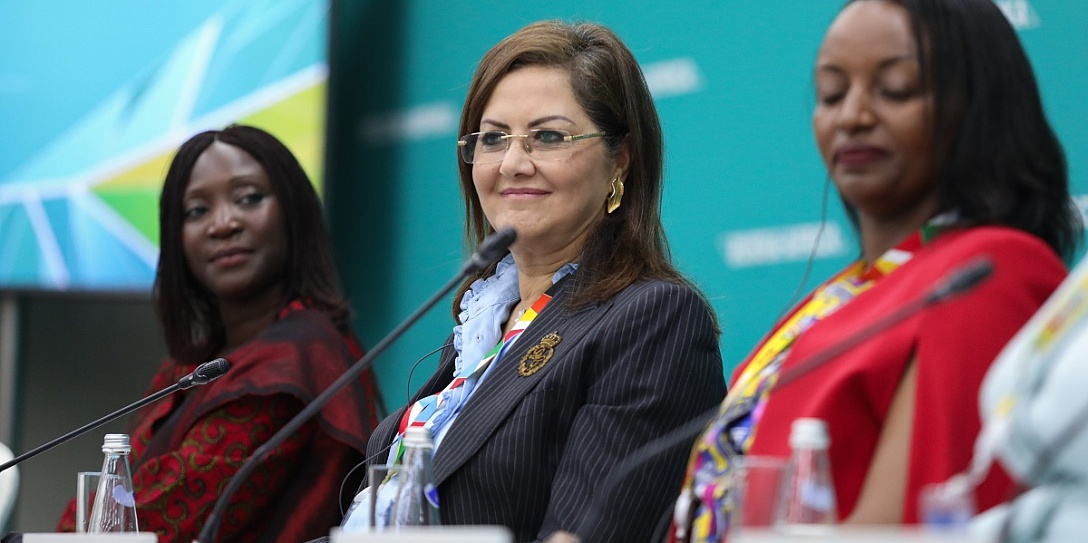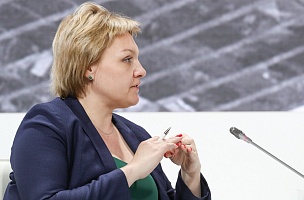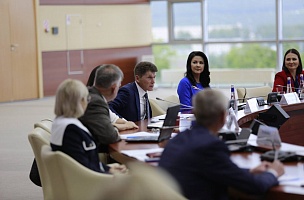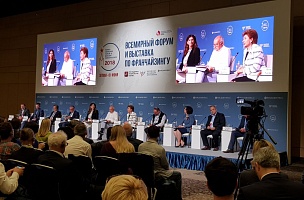KEY CONCLUSIONS
A greater role for
women in the society is a priority for the modern global development
«Egypt has a 2030 strategy for women, launched in
2016. When we started it, we included it as the foundation of our vision for
Egypt’s development. It focuses on gender balance. If you do not pay attention
to the female part of society, you will not be able to build a successful
society,» H.E. Hala Helmy Elsaid Younes, Minister of Planning, Monitoring and
Administrative Reform of the Arab Republic of Egypt.
«The Gender Equality Agenda is the fifth Sustainable
Development Goal adopted by the UN General Assembly for the period until 2030.
UNIDO gender agenda is very important and builds on the development of women’s
economic empowerment, entrepreneurship and leadership,» Veronika Peshkova,
President, Foundation for the Development of Public Diplomacy Women’s Perspective;
Goodwill Ambassador, United Nations Industrial Development Organization
(UNIDO).
African countries
contribute to resolving gender inequality problems
«In Rwanda, 50% of government members and 62% of MPs
are women. It took time and a legislative change to achieve these results,»
Soraya Hakuziyaremye, Minister of Trade and Industry of the Republic of Rwanda.
«The new constitution now requires that 25% of MPs
must be women. We support women in all areas. 25% of the ministers in Egypt are
female. This number is actually higher, thanks to a great number of women
involved in the projects that these ministers oversee,» H.E. Hala Helmy Elsaid
Younes, Minister of Planning, Monitoring and Administrative Reform of the Arab
Republic of Egypt.
«Women in Africa are part of politics — they are
politicians and leaders. They are involved in all spheres of the economy,»
Amany Asfour, President, International Federation of Business &
Professional Women.
«Over the last 5 years — 10 maximum — the African
continent has made a huge leap forward in harnessing opportunities for women’s
political, economic, social and entrepreneurial engagement,» Nataliya Zaiser,
Chair of the Board, Africa Business Initiative Union.
PROBLEMS
Poor development
of social infrastructure hinders women’s full-fledged economic activity
«In order to enable women’s work, it is necessary to
develop the institutional environment — an ecosystem that will support them. We
are engaged in the development of kindergartens and services that will allow
them to devote their time to economic activity rather than stay at home,» H.E.
Hala Helmy Elsaid Younes, Minister of Planning, Monitoring and Administrative
Reform of the Arab Republic of Egypt.
«70% of Africa’s women are involved in the informal
segments of the economy. Women who are not part of the system need to be
remembered, and they need to be able to access the system and understand what
programmes we can give them. You have to understand that even though they are
uneducated, they are also part of the industry, they work in mining, in actual
mines, and not always in a safe environment. We have to think about ensuring
their safety,» Tiguidanke Camara, Founder, Chief Executive Officer, Tigui
Mining Group (TMG).
«We would like to help vulnerable women to gain both
financial and political independence. We are implementing programmes to help
them start their own businesses and access financing, which went up from 15 to
27%. <...> Women run 50% of micro-companies,» H.E. Hala Helmy Elsaid
Younes, Minister of Planning, Monitoring and Administrative Reform of the Arab
Republic of Egypt.
SOLUTIONS
Improving women’s
access to education
«Russia has a great experience of supporting
educational programmes in Africa, when Russia offers scholarships, and here we
raise the question of improving our relations further,» Amany Asfour,
President, International Federation of Business & Professional Women.
«The changes in the education system have led to the
situation when girls can study for free and parents no longer have to choose
who of their children to send to school based on their financial muscle. Access
to education means more and more women in science and engineering,» Soraya
Hakuziyaremye, Minister of Trade and Industry of the Republic of Rwanda.
«In my organization — the TMG Foundation — we educate
women and teach them how to become part of society, independent entrepreneurs.
As a rule, these are agriculture-related industries. We organize investment
aid, launch projects that create local jobs, provide seeds and materials, and
teach how to sell the results of their work,» Tiguidanke Camara, Founder, Chief
Executive Officer, Tigui Mining Group (TMG).
Involving digital
and creative technologies
«We are now launching a digital skills training
programme for female entrepreneurs. We view the digital agenda as a crucial
development tool. We live in the era of the 4th Industrial
Revolution, when the so-called creative industries are the fastest growing.
They are faster than the global economy on average. These are segments that
still involve a very large number of women, but will remain employers when
regular office work, sales and services will get automated — that is something
we are moving towards. Today, creative industries contribute to the global
economy more than the Indian economy and provide more jobs than the automotive
industry in Western Europe, the United States and Japan combined,» Veronika
Peshkova, President, Foundation for the Development of Public Diplomacy Women’s
Perspective; Goodwill Ambassador, United Nations Industrial Development
Organization (UNIDO).
«We support creative industries — it is the foundation
of the post-industrial economy, that is why developing them is the main
challenge not just for Russia, but for the whole world as well,» Valeria
Valyaeva, high school student; Member, Agency of Strategic Initiatives to
Promote New Projects, Leader of a Creative Area.
International
cooperation and using best practices
«We must unite our efforts and come to cooperation
through mutually beneficial partnership. If someone can help us properly, with
respect to our traditions and principles, we will achieve great results,»
Slauzy Zodwa Mogami, Founder, Chief Executive Officer, Chairperson, Ladies in
the Frontline.






